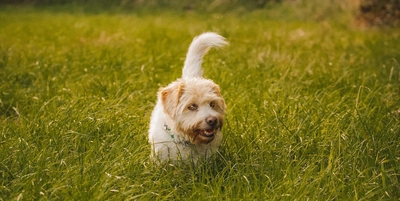Pancreatitis and fat levels
- 21 Oct 2020
- 4m read

When it comes to pancreatitis, one of the best ways to manage your dog’s symptoms is through their diet. This is because the pancreas is the organ that releases the enzymes that break down food during digestion. Now, when it comes to the specifics, things get a little… unspecific.
At the moment, the research on pancreatitis in dogs is somewhat in its infancy. In the past, a vet would have to take lots of blood samples, carry out investigative procedures such as abdominal ultrasound scans, and maybe even explorative surgery to collect samples of a dog’s pancreas in order to diagnose or rule out pancreatitis. This process could end up being time consuming and expensive.
Thankfully, in the last few years, a quick and simple blood test called a canine pancreatic lipase immunoreactivity test (cPLI) has been developed by a veterinary laboratory to allow vets to quickly rule out whether or not your dog is suffering from pancreatitis (perhaps your dog has had this test recently). The test takes just a few minutes and only needs a couple of drops of blood. It can be done in the vet practice without having to send the blood sample away and there’s no need to wait days for the results. Because of this, the number of dogs being tested has risen rapidly, and therefore many more pooches are being diagnosed and treated for pancreatitis than before.
However, the research and literature on pancreatitis haven’t quite caught up so this means that, at the moment, there is no scientific evidence to support any strict guidelines on the amount of fat a dog should or shouldn’t be eating to manage chronic pancreatitis or recover from acute pancreatitis.
So, what do we know?
The majority of vets agree that since one of the pancreas' main roles is to breakdown fat during digestion, it’s a logical step to reduce its workload by feeding a low or reduced-fat diet.
We know that dogs who are overweight and obese are more prone to suffering from pancreatitis, so it makes sense to feed a diet containing less fat to help with weight management and potentially reduce the chance of another flare-up.
Vets agree that high-quality fats from a known source are better than lower grade fats or fats from unknown sources. It’s also important that your dog’s essential fatty acid requirements are still met. With Butternut, you can be sure that the fat in our chicken meal has come from chicken and the fat in our turkey meal has come from turkey - we always
so there aren’t any surprises.
It’s very important that the fat in your dog’s diet is highly digestible so that no extra strain is put on their digestive system. Depending on the quality, most commercial dog food has a fat digestibility of 65-90%, whereas the digestibility of the fat in our meals is a whopping 99%.
The fat content that can be tolerated by your dog is specific to your dog. This means it’s imperative you run any dietary changes past your vet to make sure they’re suitable for your pooch.
Low-fat diets are less palatable and dogs suffering from pancreatitis typically have less of an appetite. Therefore, some vets will recommend a reduced or moderate-fat diet (rather than low fat) to encourage eating and support recovery.¹

What don’t we know?
Currently, there are no evidence-based fat levels suggested for dogs with pancreatitis. This means, there is no scientific research to show what fat level options are the best for these dogs.
We don’t know how much fat is too much fat. In some older studies, feeding extremely high-fat diets has triggered pancreatic inflammation yet in several recent scientific studies, when healthy dogs were fed varying levels of high-fat diets (42-37% on a dry matter basis) over a long period, no adverse effects on fat digestion were seen, nor did there seem to be an increased risk of pancreatitis for these dogs.
What’s the bottom line?
Our chicken, turkey, and fish recipes are our low-fat meals and all contain less than 6% fat as fed (less than 20% on a dry matter basis). Thousands of dogs with pancreatitis have been doing really well on these recipes and many pet parents have reported a vast improvement in their dog’s wellbeing since moving over to Butternut. You can check out their stories on our TrustPilot and Google review pages.
Before making the switch to our low-fat meals, we strongly recommend that you have a discussion with your vet about our recipes and whether they’re a suitable option for your pooch right now, as every dog has a different experience with pancreatitis. Our in-house vet nurse, Sarah, is always available if you’ve got any questions or just want to chat. We know it can be overwhelming and we’re here to help in any way we can.
References
1 - Gajanayake et al. 2013. BSAVA Textbook of Veterinary Nursing. 5th Edition. Nutrition and feeding. Chapter 13, p337.




